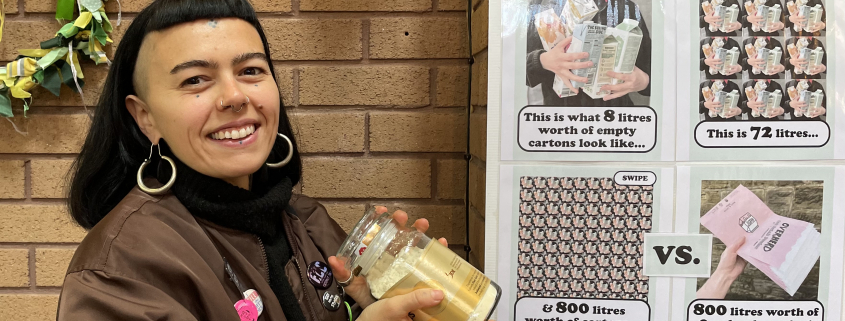Refilling Hope in a Throwaway World
It isn’t easy to make time for change. Between work, family and the daily scramble of modern life even simple acts of care can feel like luxuries. Yet at the refill station in Chanctonbury Leisure Centre I watched someone carefully scoop oat powder into a reused container and it made me pause. In that small, steady movement was a kind of hope, the quiet belief that our actions however ordinary still matter.
The recent passing of Jane Goodall brought that home again. In her final film Famous Last Words she talked about hope and how even when the world feels dark small actions multiplied millions of times can create great change. It is an idea that feels steadying.
Her words made me think not only about the power of small actions but also about how those same principles apply on a larger scale. The government’s decision to introduce a new Extended Producer Responsibility scheme is, in global terms, a small step but one that could carry weight. It is designed to make companies pay the full cost of dealing with the packaging they produce. A lot of work has already gone into reducing packaging and using more recyclable materials and yet the figures on waste remain staggering. If this change pushes things further in the right direction and brands are required to take full financial and practical responsibility for their packaging waste it might encourage them to move beyond token improvements and rethink how products are made and sold.
Over time this might mean less pressure on us, the consumers, to keep working it all out for ourselves. Instead of having to weigh up which bottle, box or brand is the least harmful we might be able to trust that the choices on the shelves are already better ones. It would free up space and energy for other kinds of action, the kind that happen in communities and homes as much as in boardrooms or government plans, because we cannot shop our way out of a waste problem that was designed into the system from the start.
Real change also depends on the choices we make locally. By supporting refill services we show what we want the future to look like and help to drive demand for better systems. Each time someone chooses to refill instead of replace they send a quiet signal that waste is not inevitable. That is what makes local refill services like the one at Chanctonbury so important. They show what shared responsibility looks like in practice. You bring your containers, refill them with what you need and maybe wonder why it is not easier to do this everywhere. It takes effort and a bit of persistence but each refill is a reminder of what could become normal if the system supported it. Perhaps the more of us who make that effort the easier it will become.
The Sussex Green Living Refill page and the national Refill app can help you find other places doing the same. It is a start and sometimes that is enough.
Jane Goodall’s message still rings true. Hope is not naive, it is necessary. We cannot all do everything and few of us have time to overhaul our lives. But when we do find a moment to act differently to reuse, refill or rethink it reminds us that change does not have to be perfect to be powerful.




